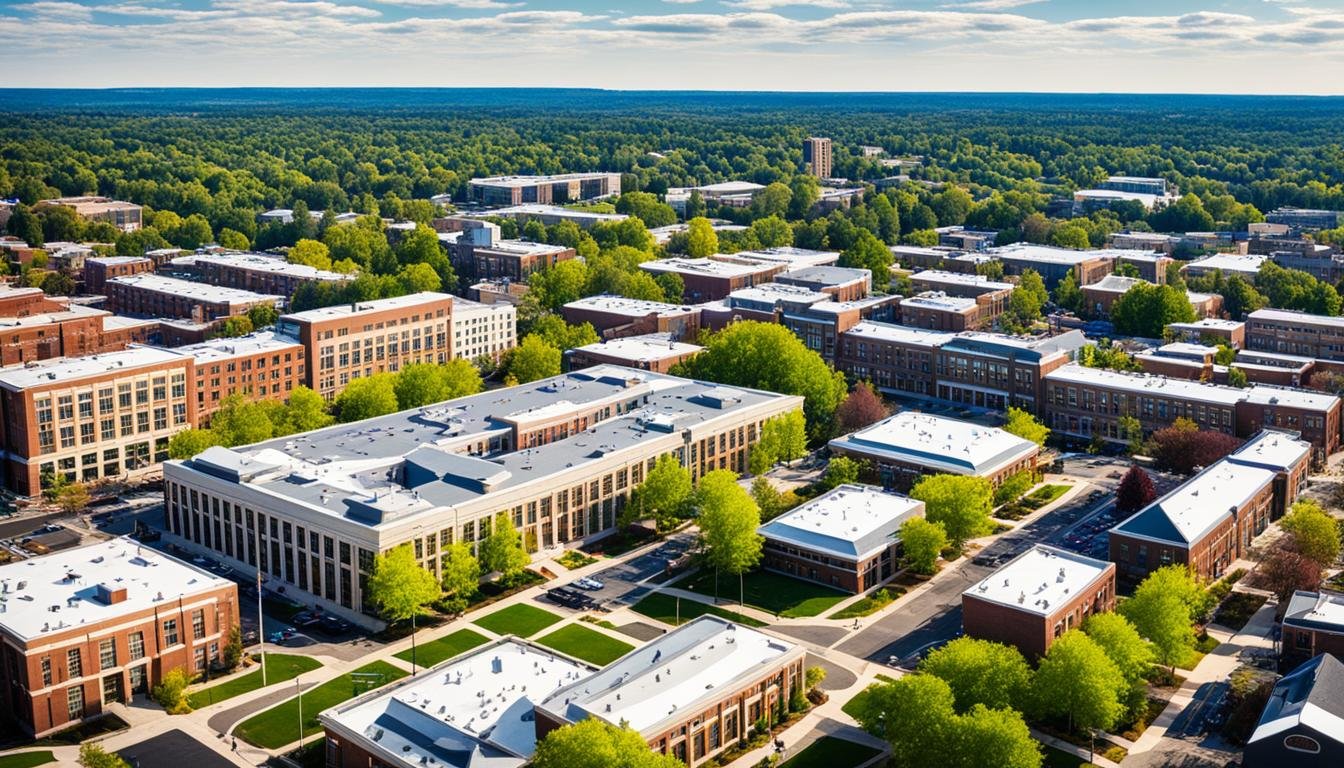When it comes to higher education, the terms “college” and “university” are often used interchangeably. However, there are distinct differences between the two that are important to understand, especially for international students. Let’s explore the disparity between colleges and universities, and how they can impact your academic journey.
In the United States, colleges typically focus on undergraduate education and may be smaller institutions. Some colleges, known as liberal arts colleges, offer a broad range of academic areas. Community colleges, on the other hand, are two-year schools that provide associate degrees and certificates.
Universities, on the other hand, are larger institutions that offer both undergraduate and graduate degree programs. Public universities, especially, are often large and enroll tens of thousands of students. They are known for their research opportunities and may have specialized academic divisions called colleges.
Key Takeaways: College vs University
- Colleges primarily focus on undergraduate education, while universities offer both undergraduate and graduate degree programs.
- Colleges may be smaller institutions, whereas universities can be larger and enroll more students.
- Community colleges provide two-year programs and grant associate degrees and certificates.
- Universities offer research opportunities and may have specialized academic divisions.
- The choice between a college and a university depends on individual academic and career goals.
What Is a College?
Colleges are often smaller institutions that focus on undergraduate education. They provide comprehensive academic programs in various fields of study, including liberal arts colleges that offer a wide range of academic areas. In addition to traditional liberal arts subjects like humanities and social sciences, liberal arts colleges may also provide degrees in science-related fields.
One type of college is a community college, which offers two-year programs that lead to associate degrees and career-related certificates. Community colleges play a vital role in providing accessible education and workforce training for students. Many students choose to start their higher education journey at a community college before transferring to a four-year college or university to complete a bachelor’s degree.
Contrary to popular belief, schools with “college” in their name also offer research opportunities for students. Many colleges provide research experiences, allowing undergraduates to engage in hands-on learning, collaborate with faculty, and contribute to ongoing research projects.
Liberal Arts Colleges and Community Colleges
Liberal arts colleges are institutions that prioritize a broad-based education, exposing students to a wide range of subjects. They emphasize critical thinking, problem-solving, and communication skills, which are highly valuable in various professional fields.
“A liberal arts education encourages students to think critically, adapt to new situations, communicate effectively, and embrace a lifelong learning mindset.”
– Dr. Sarah Johnson, President of Marsden College
Community colleges offer a different educational experience, focusing on practical skills and career preparation. They provide associate degrees and certificates that equip students with the skills and knowledge needed to enter the workforce directly.
- Broad-based education
- Emphasis on critical thinking
- Diverse academic areas
- Community Colleges:
- Career-focused programs
- Associate degrees and certificates
- Practical skills development
Both liberal arts colleges and community colleges play important roles in the higher education landscape, offering diverse learning opportunities to suit different academic and career goals. They provide pathways for students to pursue their passions, whether it’s continuing their education or entering the workforce.
What Is a University?
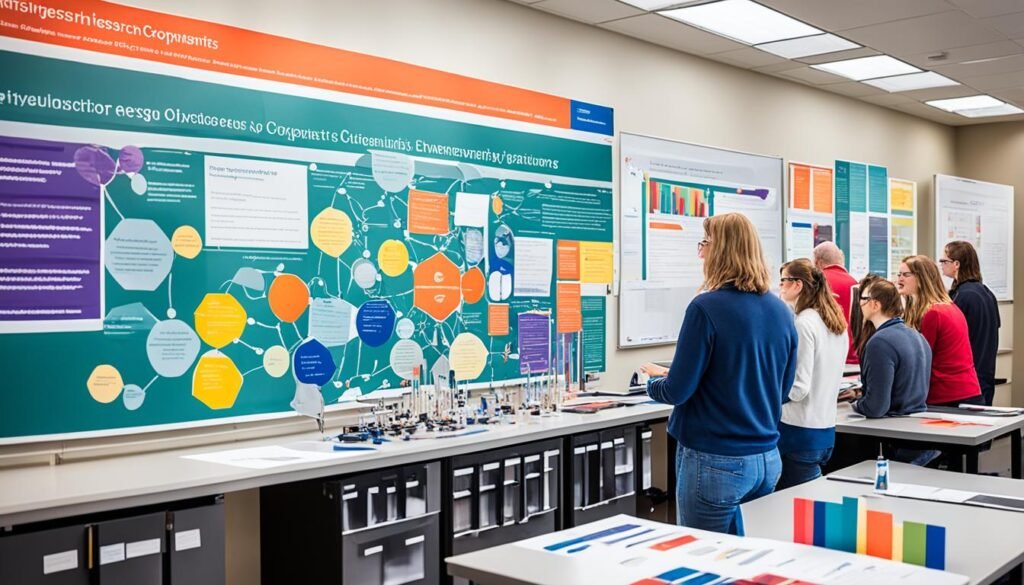
A university is an expansive institution that offers a wide variety of undergraduate and graduate degree programs. With the ability to enroll tens of thousands of students, universities are dedicated to advancing education and promoting research in various fields. They provide an excellent opportunity to pursue higher education and expand one’s knowledge and skills.
There are two main types of universities: public and private. Public universities tend to be larger, accepting a significant number of students. They offer diverse academic programs and research opportunities. Private universities, on the other hand, can be more selective and prestigious. Ivy League universities are prominent examples of private institutions known for their academic excellence and rigorous admission process.
Within universities, there are often specialized academic divisions referred to as colleges. These colleges have specific focuses in various academic areas, such as business, engineering, or social work. Undergraduate students can choose a specific college within the university that aligns with their academic interests and goals.
Universities provide a wealth of research opportunities compared to colleges. As centers of innovation and academic excellence, universities propel groundbreaking research that often impacts society on a global scale. However, it’s important to note that undergraduate students may need to compete with graduate students for resources and research opportunities.
Overall, universities offer a dynamic and comprehensive educational experience, nurturing students into well-rounded individuals ready to make an impact in their chosen fields. They provide an extensive range of academic programs, access to renowned faculty, and a vibrant campus life. With their commitment to research, universities create an environment that fosters intellectual growth and opportunities for future success.
Which Type of School Is Right for You?
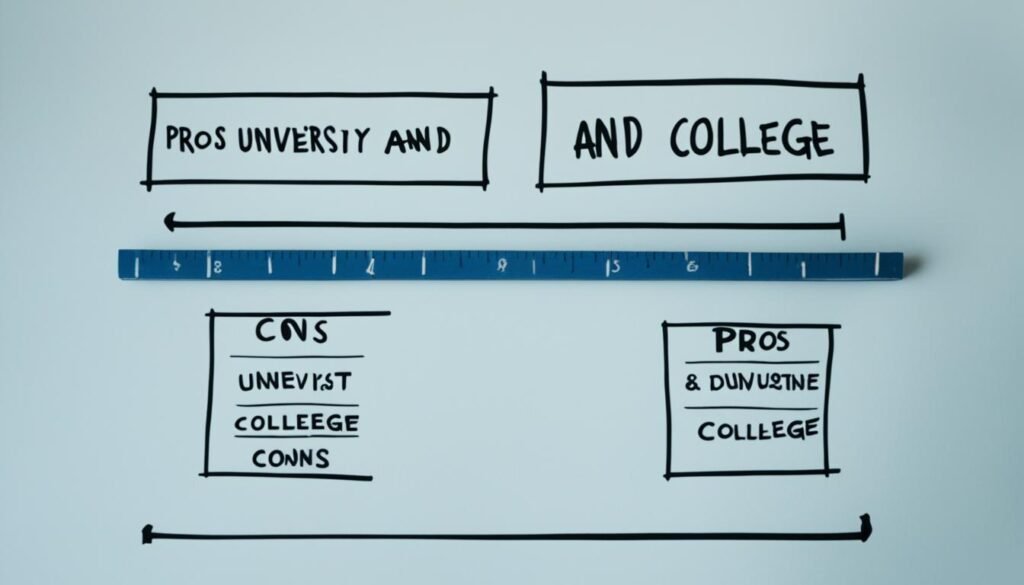
When it comes to choosing between a college and a university, there are several factors to consider in order to find the right fit for your academic and career goals. These selection criteria include class sizes, faculty-to-student ratios, research opportunities, and campus life.
Colleges often provide a more intimate college experience, with smaller class sizes and a focus on personalized education. If you prefer a close-knit community and more individualized attention from faculty, a college might be the right choice for you.
On the other hand, universities offer a wider range of programs and research opportunities. They often have larger class sizes, which can provide a more diverse learning environment. If you’re interested in a greater variety of academic offerings and research experiences, a university may be the better option for you.
It’s important to align your choice with your academic and career goals. If you have specific career aspirations or want to pursue a particular field of study, consider whether a college or a university has the resources and programs that align with your interests.
Here’s a breakdown of some key factors to consider:
- Class sizes: Colleges typically have smaller class sizes, allowing for more individualized attention from professors.
- Faculty-to-student ratios: Colleges often have lower faculty-to-student ratios, enabling more meaningful interactions and mentorship opportunities.
- Research opportunities: Universities generally offer more extensive research opportunities, which can be advantageous if you have a keen interest in research.
- Campus life: Consider the campus culture and community environment. Are you looking for a close-knit campus with strong traditions, or do you prefer a bustling and diverse university setting?
“Choosing the right type of school is an important decision that can significantly impact your college experience and future career.”
To help you make an informed decision, it may be beneficial to visit campuses, talk to current students and alumni, and explore the academic and extracurricular opportunities available at both colleges and universities. Ultimately, consider your own preferences, learning style, and aspirations to determine which type of institution aligns best with your goals.
| Factors to Consider | Colleges | Universities |
|---|---|---|
| Class Sizes | Smaller class sizes | Larger class sizes |
| Faculty-to-Student Ratios | Lower ratios | Higher ratios |
| Research Opportunities | Varies by institution | More extensive opportunities |
| Campus Life | Close-knit community | Diverse and vibrant campus |
Pros and Cons of Universities

Universities offer a wide range of programs and course offerings, catering to different academic and career goals. Whether you are interested in pursuing undergraduate or graduate programs, universities provide ample opportunities for higher education. One of the key benefits of attending a university is the availability of diverse research opportunities. Universities are renowned for their commitment to research, and students have the chance to engage in faculty-led research projects. This hands-on experience can greatly enhance their academic and professional development. Furthermore, universities often boast highly qualified faculty members who are experts in their respective fields, providing students with valuable insights and mentorship.
Universities typically have a diverse campus community, offering students the opportunity to interact with peers and faculty members from various backgrounds. This fosters a rich learning environment where diverse perspectives can be shared and understood. Additionally, universities generally provide a wide array of resources and support services, such as libraries, laboratories, and specialized facilities, that enrich the learning experience.
However, it’s important to consider some potential drawbacks of attending a university. One factor to keep in mind is the potential for larger class sizes. Due to the larger student population at universities, some classes may have higher student-to-faculty ratios, which can limit individualized attention. Additionally, universities often have higher tuition costs compared to colleges, which may pose a financial challenge for some students. It’s crucial to weigh the benefits against the potential drawbacks when considering a university education.
Research opportunities and faculty-led research projects are integral to the university experience. They allow students to dive deep into their chosen academic fields and make meaningful contributions to their respective disciplines.
Pros and Cons of Colleges

Colleges are known for their focus on undergraduate teaching, providing students with a more personalized and engaging educational experience. One of the advantages of attending college is the opportunity for smaller class sizes, allowing for increased interaction with professors and classmates. This creates a supportive and collaborative learning environment where students can receive individualized attention and guidance.
Another advantage of colleges is the potentially lower costs compared to universities. Many community colleges offer more affordable options for higher education, making it accessible to a wider range of students. These institutions often provide financial aid and scholarships to help students manage tuition expenses.
In addition to traditional academic programs, colleges often offer vocational programs and professional certificates. These specialized programs prepare students for specific careers, equipping them with the practical skills and knowledge necessary for success in their chosen fields. This can be particularly beneficial for students who have clear career goals and want to enter the workforce more quickly.
Despite these advantages, it’s important to consider that colleges may have limited program offerings compared to universities. Universities often have a broader range of academic disciplines and degree programs, allowing students to explore a variety of subjects and pursue a more diverse education. This can be advantageous for students who are undecided about their major or interested in interdisciplinary studies.
Ultimately, the decision to attend a college or a university depends on individual preferences, academic goals, and career aspirations. It’s essential for students to consider their interests, learning style, and desired learning environment when choosing the right institution for their higher education journey.
What About Colleges Within Universities?
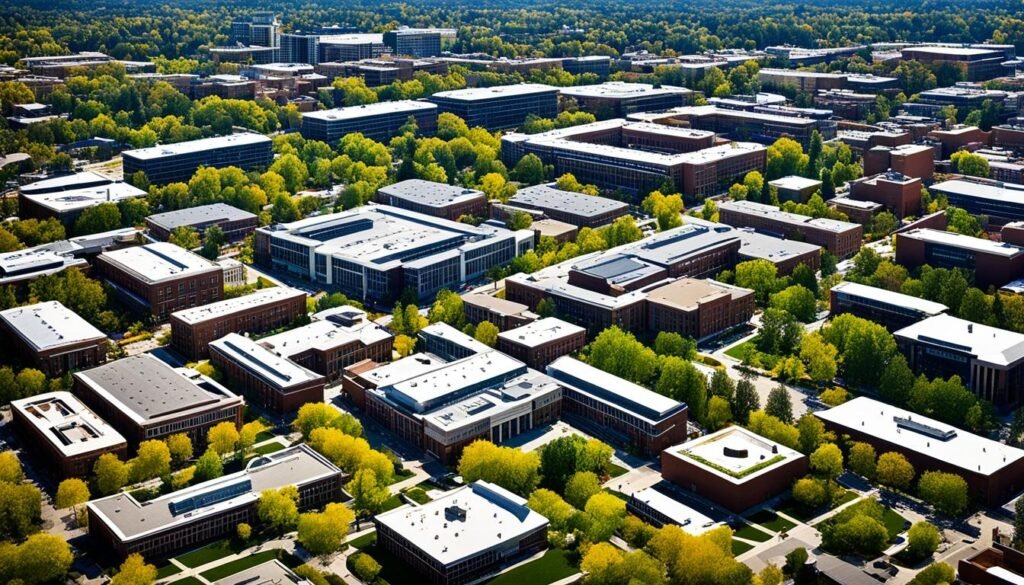
Some universities have specialized academic divisions called colleges that provide students with focused academic majors and program offerings within the larger university structure. These colleges concentrate on specific academic areas or disciplines, such as business, engineering, or social work. The presence of colleges within universities allows students to pursue a more specialized education in their chosen field of study.
Colleges within universities often have smaller class sizes, providing students with a more intimate learning environment. With fewer students in each class, students can receive personalized attention from professors and engage in more interactive discussions. The smaller class sizes also promote a closer-knit community and allow for more individualized instruction and mentoring.
Furthermore, these specialized academic divisions offer a range of academic majors and program offerings tailored to the specific discipline or field of study. Students can explore various academic pathways and choose a major that aligns with their career goals and interests. Whether students are interested in pursuing a degree in business administration, computer science, or psychology, colleges within universities provide a breadth of program options to cater to diverse academic interests.
Ultimately, colleges within universities offer the best of both worlds—the resources and opportunities of a larger university with the personalized attention and specialized curriculum of a college. By combining the benefits of a comprehensive university education with the focused approach of individual colleges, these academic divisions create a unique and enriching learning environment for students.
“Colleges within universities provide students with the opportunity to immerse themselves in a specialized academic environment. They offer smaller class sizes, a more focused curriculum, and a range of academic majors and program offerings.”
| Pros of Colleges within Universities | Cons of Colleges within Universities |
|---|---|
| Smaller class sizes | Limited program offerings compared to universities |
| Focused and specialized academic divisions | Competition for resources and opportunities within the college |
| Personalized attention from professors | May not have the same breadth of research opportunities as larger universities |
| A tight-knit community within the college |
Overall, colleges within universities offer students the chance to immerse themselves in a specialized academic environment while benefiting from the resources and opportunities of a larger university. The choice between a college and a college within a university ultimately depends on a student’s individual preferences, academic goals, and desired learning environment.
Program Offerings in Colleges Within Universities
Colleges within universities offer a wide range of program offerings across diverse academic disciplines. Here are a few examples of specialized academic divisions found within universities:
- College of Business: Focuses on business administration, finance, marketing, and entrepreneurship.
- College of Engineering: Concentrates on engineering fields such as civil, mechanical, electrical, and computer engineering.
- College of Arts and Sciences: Offers a broad range of liberal arts programs including English, mathematics, history, and social sciences.
These are just a few examples, but colleges within universities cover a wide spectrum of academic areas and offer programs to cater to various interests and career goals.
Should You Attend a College or a University?

When considering your academic and career goals, it is important to carefully evaluate whether attending a college or a university is the best choice for you. Both options have their own unique advantages and it ultimately comes down to your learning style, desired college experience, and future plans.
If you have a specific field of study in mind and prefer a more personalized learning experience, a college with smaller class sizes may be the right fit for you. Colleges often prioritize undergraduate education and provide an intimate environment where students can develop close relationships with professors and receive individualized attention. This can be especially beneficial if you prefer a hands-on approach to learning or if you thrive in a close-knit community.
On the other hand, universities offer a broader range of programs and research opportunities that can be advantageous if you are considering pursuing a graduate degree or if you have a strong interest in research. Universities tend to have larger faculty and resources, which can provide access to cutting-edge research and state-of-the-art facilities. Additionally, universities often attract renowned faculty members and guest lecturers, offering a wider range of expertise and perspectives.
Consider your long-term academic and career goals when making this decision. If you’re interested in advancing your education beyond a bachelor’s degree and aspire to pursue a graduate degree, then a university may be the better choice. Universities generally have more options for graduate-level programs and can offer specialized coursework in your chosen field.
Furthermore, universities often have extensive research opportunities, allowing you to delve deeper into your area of study and contribute to the advancement of knowledge. This can be particularly appealing if you thrive in a research-oriented environment or aspire to pursue a career in academia or industry research.
It’s important to note that while colleges tend to focus on undergraduate education, many offer research opportunities for students as well. Likewise, universities provide undergraduate education and offer a variety of majors and degree programs that can cater to your specific interests and aspirations.
Ultimately, the decision between attending a college or a university should be based on your personal learning style and preferences, as well as your academic and career goals. Consider what kind of college experience you are looking for, whether you value personalized attention or a broader range of programs and resources. Reflect on your future ambitions and determine which institution aligns better with your aspirations.
By carefully weighing your options, you can make an informed decision that sets the stage for a successful academic journey and propels you towards achieving your career goals.
Comparison of College vs. University
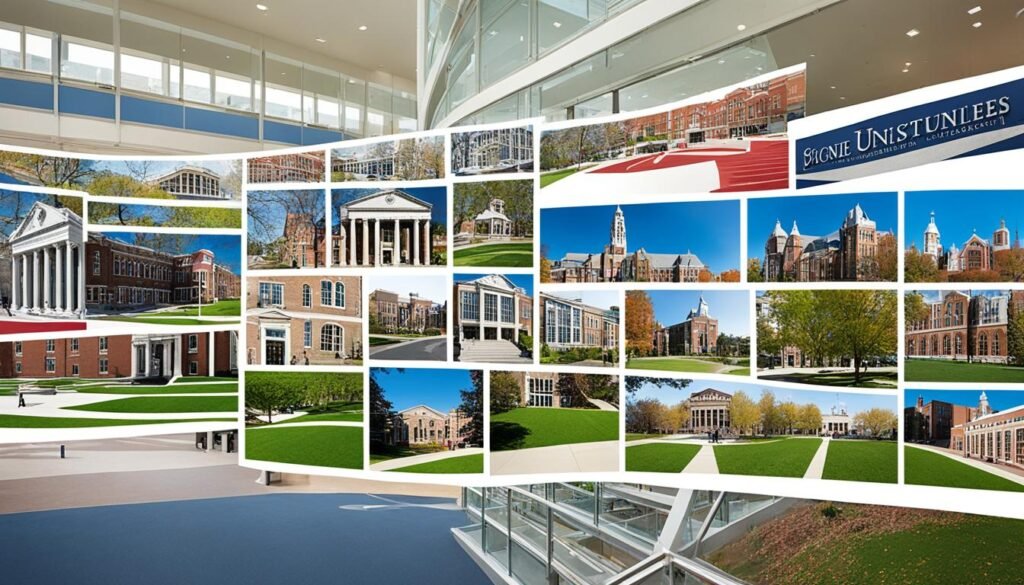
Understanding the difference between colleges and universities is crucial when considering higher education options. While the terms “college” and “university” are often used interchangeably, they refer to different types of institutions with distinct characteristics.
Colleges
Colleges primarily focus on undergraduate education, offering a wide range of associate and bachelor’s degree programs. These institutions provide a comprehensive academic foundation in various fields of study, catering to students aiming to obtain an undergraduate degree.
Universities
On the other hand, universities are higher education institutions that offer both undergraduate and graduate degree programs. In addition to bachelor’s degrees, universities provide master’s and doctoral programs, enabling students to pursue advanced degrees and specialized areas of study.
Comparison
Here is a comparison between colleges and universities:
| Comparison | Colleges | Universities |
|---|---|---|
| Degree Programs | Primarily focus on undergraduate degrees | Offer undergraduate, graduate, and doctoral degrees |
| Size | Varies in size, ranging from small liberal arts colleges to larger institutions | Can be larger institutions with a broader range of programs and research opportunities |
| Academic Focus | Comprehensive undergraduate education with diverse degree offerings | Expanded academic offerings with specialized divisions and research opportunities |
Ultimately, the decision to attend a college or a university depends on individual preferences and academic goals. Colleges may be a suitable choice for those seeking a focused undergraduate education, while universities offer a broader range of programs and research opportunities for students looking to pursue graduate degrees. It is essential to consider factors such as academic interests, career goals, and learning style when making a decision.
Also Read : Top 10 Universities In World With Ranking And Review
Conclusion
Understanding the distinction between colleges and universities is essential, especially for international students. While the terms “college” and “university” are often used interchangeably, they represent different types of higher education institutions with unique focus areas and degree offerings.
Colleges primarily emphasize undergraduate education, providing students with a strong foundation in their chosen fields. They offer associate and bachelor’s degrees, preparing students for entry-level positions in various industries. On the other hand, universities provide a broader range of opportunities by offering both undergraduate and graduate degrees. This allows students to continue their education and specialize in specific fields, ultimately increasing their career prospects.
The decision of whether to attend a college or a university should be based on individual academic and career goals, as well as personal learning styles and preferences. If you are seeking a more focused and personalized learning experience, a college may be the right choice. However, if you are interested in pursuing advanced degrees or conducting research, a university may offer more comprehensive resources and opportunities to support your aspirations.
Ultimately, the choice between a college and a university depends on what you hope to achieve in your higher education journey. Both institutions play vital roles in shaping the future of students and offering pathways to success. It is essential to conduct thorough research, visit campuses, and consult with academic advisors to make an informed decision that aligns with your goals.
FAQs
Q: What is the difference between college and university?
A: The main difference between a college and a university is that a university typically offers undergraduate and graduate programs, while a college tends to offer only undergraduate degrees.
Q: Are colleges and universities the same thing?
A: No, colleges and universities have different structures and offerings. Colleges usually focus on undergraduate education, while universities offer a wider range of academic programs, including graduate studies.
Q: Should I attend a community college before transferring to a university?
A: Attending a community college and then transferring to a university can be a cost-effective way to complete your education, especially if you are unsure about your career path or want to save money on tuition.
Q: What factors should I consider when choosing between a college and a university?
A: When deciding between a college and a university, consider the type of degree programs offered, campus size, location, student population, and your long-term academic and career goals.
Q: Is there a difference between college within a university and a standalone college?
A: Yes, a college within a university is typically a smaller academic unit that offers specialized programs, while a standalone college operates independently and may have a narrower focus.
Q: What is the difference between Harvard College and Harvard University?
A: Harvard College is the undergraduate school within Harvard University, which is a renowned private research university located in Cambridge, Massachusetts.
Q: What are some pros and cons of attending a community college?
A: Pros of attending a community college include lower tuition costs, smaller class sizes, and the opportunity to explore different academic paths. However, cons may include limited program offerings and resources compared to universities.
Source Links
- https://www.forbes.com/advisor/education/student-resources/differences-between-college-and-university/
- https://www.bestcolleges.com/blog/difference-between-college-and-university/
- https://www.usnews.com/education/best-global-universities/articles/college-vs-university-whats-the-difference
